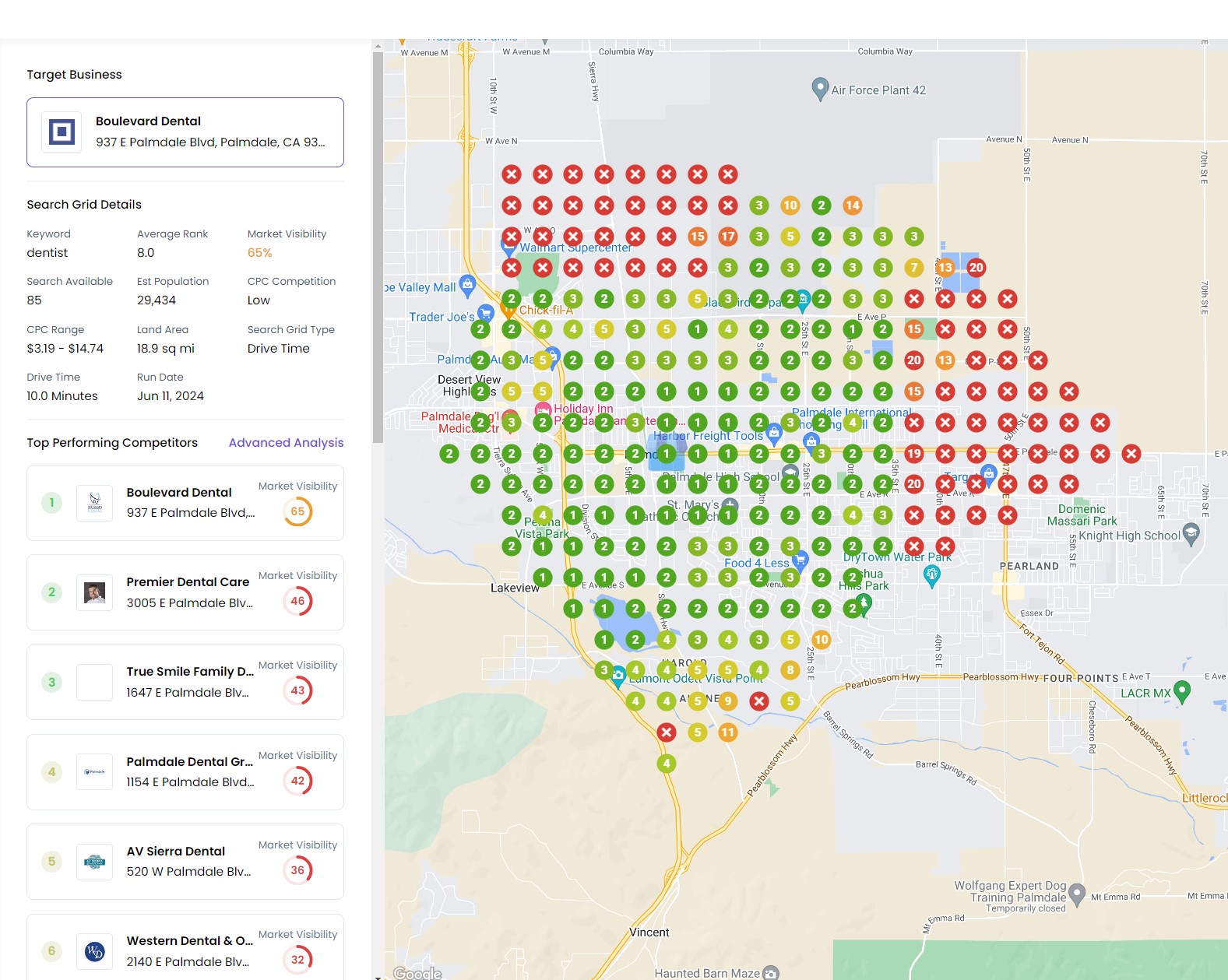Geo Grid Mapping and Local Search Grid
What is the difference between Drive Time, Polygon, and Radius Geo Grid Maps on Aldus Local?

Drive-time Mapping: Ideal for location-based businesses, this mapping shows how rankings change based on varying drive times from your business location.
Polygon Mapping: Best for businesses without a physical location on their GBP, this type accurately represents service areas by automatically eliminating irrelevant geographic features like water and forests.
Radius Mapping: Provides quick insights by showing how a business ranks within a circular radius from a specific point.
Basic Mapping: Not used by Aldus Local due to its general lack of precision. This basic form of Geo Grid typically provides an introductory overview of rankings across standard grid layouts (5x5, 7x7, 9x9, etc.).
- How many keywords can I have per Local Search Grid report and can I purchase more? Each Local Search Grid report in Aldus Local starts with a capacity for 10 keywords. If more are needed, additional keywords can be purchased to extend the report's scope.
- Why are my Local Search Grid results different from the results I see in similar tools from other brands? Differences in results may arise due to variations in data collection methodologies, timing of data retrieval, and the specific algorithms used by different tools. Aldus Local ensures up-to-date and region-specific accuracy which might differ slightly from other tools.
- Can I archive a report run in a Local Search Grid report? Yes, you can archive completed reports within Aldus Local to maintain organizational clarity while retaining access to historical data for comparative analysis over time.
- Can I see the search results on my Local Search Grid report? Yes, the Local Search Grid report in Aldus Local provides a detailed visualization of search results, showing how your business ranks across different grid points for specified keywords.
- What platform does Local Search Grid use to find and report on rankings? Aldus Local’s Local Search Grid utilizes Google’s search data to accurately report on rankings, ensuring relevance and timeliness in the reported information.
- What do the colors mean in any Search Grid report? In Aldus Local Search Grid reports, different colors represent various ranking positions. Typically, warmer colors (e.g., red, orange) indicate higher rankings, while cooler colors (e.g., blue, green) denote lower rankings.
- How is my average rank calculated in a Local Search Grid report? The average rank is computed by averaging the ranks of a keyword across all grid points where your business appears, providing an overall performance indicator within the grid.
- Can I flag my competitors' spam to Google through Aldus Local? Currently, Aldus Local does not support direct reporting of competitor spam to Google. Users are advised to use Google’s official channels for reporting suspicious or spammy activities.
- If I remove a keyword from a Local Search Grid report, will I lose the data? Removing a keyword from an ongoing report will stop future data collection for that keyword, but historical data collected prior to its removal will still be accessible.
- Can I edit my Local Search Grid report without running it, to save my credits? Yes, you can make changes to your report settings without rerunning the report, allowing you to adjust parameters without consuming additional credits. However, to reflect these changes in your results, eventually, a new run will be necessary.
- Can I see my competitors' ranking results in Local Search Grid reports? Yes, Aldus Local’s Local Search Grid reports can include your competitors' ranking data, offering comprehensive insights into your competitive landscape for targeted keywords.
How do I find my Google Maps URL for Local Search Grid? To find your Google Maps URL, search for your business on Google Maps, click on your business listing, and copy the URL from the browser's address bar. This URL is essential for accurately setting up location-specific features in Aldus Local.

